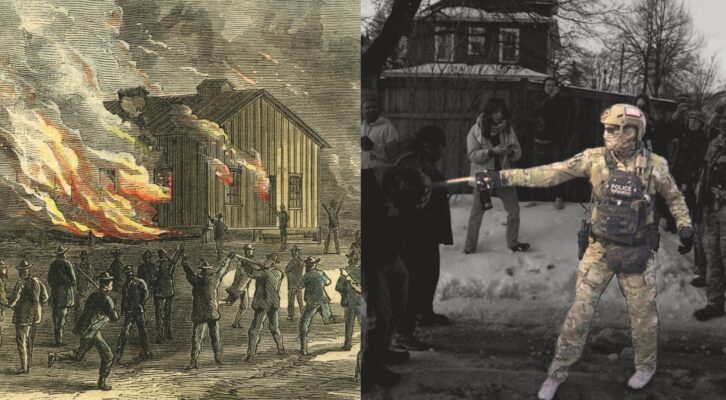Among the many challenges facing Brigadier Hinde that spring was to purge the British sector of all remaining Nazis. Denazification was a cornerstone policy of the four occupying powers, and every German over the age of eighteen was required to fill in a Fragebogen, or “questionnaire,” answering 130 questions about his or her previous employment, income, and education. “What political party did you vote for in the November election of 1932? What did you vote for in March 1933?” Some questions were as obscure as they were bizarre. “What titles of nobility were ever held by you or your wife or by the parents or grandparents of either of you?” Hinde’s specialists assessed these questionnaires and placed each respondent on a sliding scale of guilt. At one end were the active henchmen of the Nazi regime: Gestapo members, prison guards, and brutal SS thugs. At the other were the unwilling travelers who had joined the Nazi Party because it was the ticket to a quieter life. Penalties ranged from imprisonment to exclusion from employment, while those found free of guilt were given a certificate that became known as a Persil-Schein, or “Persil ticket,” indicating that its holder was “whiter” than the brand of laundry detergent to which it referred.
Hinde viewed denazification as a vital part of the postwar cleansing process. “We should be guided by the principle that if denazification is worth doing, it is worth doing thoroughly.” He urged his team to read a pamphlet produced by Frank Howley’s unit: it was entitled Are There Any Good Nazis? “When you have read it,” he said, “you will probably agree with me that there are none.”
Berlin’s four ruling powers formed specialist bureaux to oversee the denazification process, a wise decision given the complexity of the task. One such bureau, Cultural Affairs, was tasked with vetting Berliners wishing to resume work in the world of the arts. No one was to be granted a license unless they could prove they had a clean slate. It sounded easy enough on paper, but it was dependent upon agreement among the four powers, and this was in increasingly short supply in that fraught spring of 1946.
Brigadier Hinde’s representative was Maj. Kaye Sely, a Munich-born bon viveur whose approach to denazification immediately raised eyebrows. Not only did he disagree with his American, French, and Soviet colleagues, but he also criticized the unbending approach of his boss. He intended to take a far more relaxed approach than that of Brigadier Hinde, turning a blind eye to all but the worst offenders. “What’s it matter whether a road-sweeper, butcher, baker, candle-stick maker was or was not in the party?” he said. “We waste time, energy and money catching those little fish in our net.” Sely was hunting the big game and was not interested in the minor players. His laissez-faire approach threw him into immediate conflict with the American representative Ralph Brown, who took his cue from Frank Howley. “If there is the slightest smell of Nazism, out they go.”
The French attitude was radically different, and perfectly encapsulated by Gauloises-smoking representative Michel Bouquet. He found the whole process a pointless chore. One of Hinde’s men noted wryly that the French detested all Germans, not just those who were Nazis. “If one could have degermanised the Germans, the French would have been enthusiastically for it.” But they had no interest in determining the level of someone’s guilt.
The Soviet approach was altogether more duplicitous. Daily Telegraph journalist Anthony Mann conducted an undercover investigation into their activities and discovered a disturbing twin-track policy. In public, they were deeply hostile to former Nazis, but in private they took a very different approach. “If any German had special skills or knowledge useful to the Soviet authorities,” he said, “his Nazi past was irrelevant.”
This was true enough. The Lux Hotel revolutionary Wolfgang Leonhard admitted that skilled Nazis were offered immediate employment: “[It was] a question of how can we use them.” If they were ready to cooperate, “they immediately got high positions.”
Former henchmen of the Third Reich were encouraged to switch sides by being offered a stark choice: incarceration or promotion. “We have your documents, we can put you in prison for ten years, we can send you for ten years to Siberia. Or you can have a second chance. If you sign [a contract] that you will work with us, you can live in peace and, even more, we can promote you.” It was a policy that worked. “Thousands of former higher Nazis immediately became informers for the NKVD, the Soviet state security.”
The four powers forged a consensus of sorts in the early stages of denazification, but this was to be abruptly shredded by the arrival from Moscow of a Soviet colonel named Sergei Tiulpanov. Ruthless and intellectually brilliant, Colonel Tiulpanov quickly realized there was political capital to be made out of denazification. With a single-mindedness that stunned all who witnessed it, he set out to exploit this capital.
Tiulpanov was the incoming head of the Soviet Information Bureau, working closely with General Kotikov. It was a uniquely powerful post, for Tiulpanov was in charge of every aspect of culture, including theater, cinema, journalism, and propaganda. His fiefdom included the whole of Soviet-occupied Germany, but it was in Berlin that he was to fight his sharpest battles.
He cut an unmistakable figure in the streets of the capital on account of his punch-bag physiognomy. “His face, his manner, his whole appearance immediately arrested my attention,” wrote American information officer Nicolas Nabokov. “His head was clean-shaven and had large protruding ears. It was totally neckless, like an oversized billiard ball on a short, well-built body.”
Tiulpanov eschewed military decorations, apart from a discrete red star, and looked so ill at ease in uniform that one acquaintance described him as “a civilian in disguise.” Unlike General Kotikov, he had turned down lodgings in the secure Karlshorst compound and opted instead for a sprawling villa in Weissensee. From there, he ran a mini-empire that inspired admiration and fear. “If Tiulpanov so much as crosses the street, it means something,” said one terrified Soviet functionary,
Charming but choleric, he did not suffer fools gladly. He lambasted a sycophantic Berlin theater director for his praise of a dreadful Soviet movie. “Why don’t you tell us the truth?” he snapped. “We’ve had quite enough arse-crawlers who find everything we do wonderful.”
Tiulpanov’s encyclopedic knowledge of Germanic culture made him a formidable enemy to the Western allies. He had studied at the University of Heidelberg and could discuss Goethe’s writings with the insight of an academic. He even kept a statue of the writer on his desk. By the summer of 1946, Tiulpanov was influencing public opinion in every sphere of culture. His principal mission was to win the hearts and minds of Berliners, not an easy task given the raping and looting that had taken place in the recent past. “There was an urgent need,” said one, “to prove that the country of Pushkin, Tolstoy, Dostoevsky, Chekhov and Gorki was cultured and civilised.” Tiulpanov aimed to demonstrate that Russians and Germans shared a love of high culture—unlike the uncouth, gum-chewing Americans or the middle-brow British with their preposterous Gilbert and Sullivan operettas.
To assist him in his task, he had picked a team of intellectuals who understood that culture was the perfect vehicle for propaganda. Tiulpanov’s deputy Alexander Dymshitz was a former professor at Leningrad University with a deep knowledge of German history. Other recruits brought specific skills that would help them in the task ahead. “Virtually all Russian culture officers were carefully selected specialists,” said the British officer George Clare. “They had a lot going for them.”
They rapidly restored the city’s principal concert halls and encouraged Berlin’s finest performers to return to work, even if they had been enthusiastic Nazis. One of the first concerts they organized was Beethoven’s Fidelio, at the State Opera. It was a profoundly moving experience for the Berlin audience, for whom a night at the opera seemed to belong to the distant past.
Curt Riess studied Tiulpanov’s maneuvering with appalled fascination. The Soviet was a formidable enemy with an ambitious goal. “He wanted to bring all of Berlin under Russian control,” said Riess. “It was going to be a fast, surprise assault which would not give the Western powers a chance to recover their balance.”
___________________________________


















